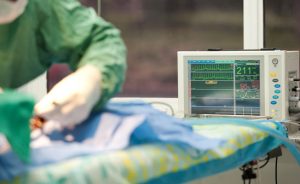Colorectal Cancer is on the rise in younger people. Just ask Darren Pedersen

In Canada, one in twelve people will get colorectal cancer; more often this will happen in patients in their 30’s, 40’s and younger. In an article in PHC News, CHÉOS Scientist Dr. Manoj Raval noted the increasing incidence rates of colorectal cancer among younger patients, a contrast to declining rates of colorectal cancer overall. In his practice as a colon and rectal surgery specialist at St. Paul’s, Dr. Raval has noticed the rising number of people under the age of 50 diagnosed with colon and rectal cancer.
Dr. Raval also led a patient awareness event on March 12 for Colorectal Cancer Awareness Month which took place in March. Speakers covered everything—from screening, prevention, treatment, and recovery—that patients should know about colorectal cancer. CHÉOS Scientists Drs. Carl Brown and Terry Phang are also colorectal surgeons at St. Pauls.
—
Why do women donate more kidneys than men?

Since 2005, the number of live kidney transplants in the U.S. has declined, a recent study co-authored by CHÉOS Scientists Drs. Jagbir Gill, Caren Rose, and John Gill reported. Dr. Jagbir Gill spoke with PHC News about how financial barriers may explain this decline, which appears to be driven by a decline in donation among men. The potential lost income during recovery from surgery may be deterring men from donating. The decline in donations was most pronounced among lower-income men, further implicating the role of income in the decision to donate.
Similar articles appeared in EurekAlert!, HealthDay, South China Morning Post, Renal & Neurology News, GDN Online, and Reuters.
—
New heroin treatment could save lives and money, Vancouver study says

CHÉOS Scientist Dr. Nick Bansback was interviewed on the Roundhouse Radio Vancouver show Middays with Jody Vance to discuss the results and implications of the recently published cost-effectiveness analysis finding injectable hydromorphone, a licensed pain medication, might provide greater benefits and be more cost-saving in the long-term than methadone alone in individuals with severed opioid disorder. He also commented on the potential of hydromorphone in an article in the Vancouver Courier examining the use of cannabis and prescription heroin in tackling the opioid crisis. The study, which came out of the SALOME (Study to Assess Longer-term Opioid Medication Effectiveness) trial, was co-authored with CHÉOS Scientists Drs. Eugenia Oviedo-Joekes, Michael Krausz, Martin Schechter, and Aslam Anis.
Articles covering the results of the study also appeared in Richmond News, Vancouver Is Awesome, and Burnaby Now.
—
Health benefits of cycling could save lives

Cycling has benefits for both mental and physical health which could help alleviate the burden of chronic disease. CHÉOS Scientist and #familydoconabike, Dr. Rita McCracken, spoke with the Georgia Straight about the why from a health perspective cycling infrastructure is a good investment for cities and commending Vancouver on its efforts in increasing access to safe cycling so far.



